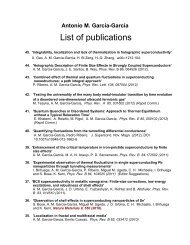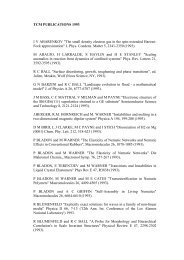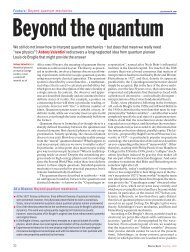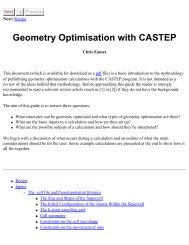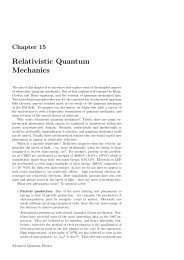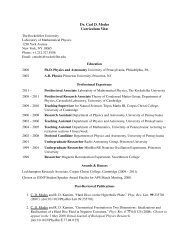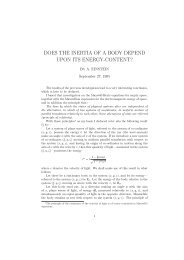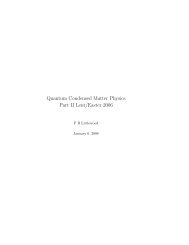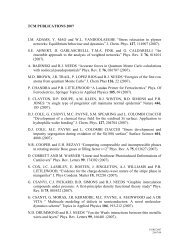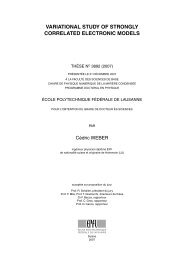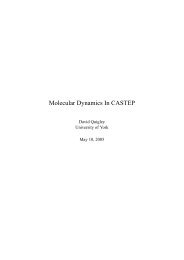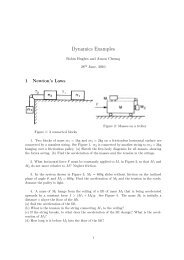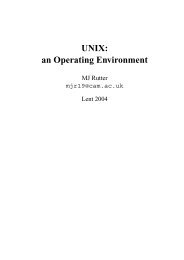CASINO manual - Theory of Condensed Matter
CASINO manual - Theory of Condensed Matter
CASINO manual - Theory of Condensed Matter
You also want an ePaper? Increase the reach of your titles
YUMPU automatically turns print PDFs into web optimized ePapers that Google loves.
• Track down bugs either by (i) inserting write statements in the code and recompiling or (ii)<br />
using a debugger (such as gdb) in conjunction with binaries that have been compiled with the<br />
debugging flags set, which you can use by passing the --debugger=debugger-binary option to<br />
runqmc.<br />
• Any utilities you write should also be tested by compiling and running with full debugging flags.<br />
Use, e.g., man f90 to find out about the available debugging flags for your compiler.<br />
• If you get stumped and have to send a bug report to us in Cambridge, then please make sure that<br />
everything we need to reproduce the problem is attached or otherwise available. Our record so<br />
far is an exchange <strong>of</strong> 24 emails—beginning with one stating ‘casino doesn’t work!’—before we<br />
discovered precisely what it was the user was complaining about (that is, what the problem was,<br />
rather than the solution). We shall leave it to you to guess which distinguished London-based<br />
pr<strong>of</strong>essor we are referring to.<br />
A.4 Performance<br />
casino can print a detailed timing analysis at the end <strong>of</strong> the output file when it has finished a<br />
calculation. This information can be useful to the programmer in deciding what optimizations to do<br />
to make the program run faster. It is generally disabled by default since, annoyingly, the process<br />
<strong>of</strong> calculating the timings slows down the code significantly. To activate the detailed analysis, set<br />
timing info=T in the input file.<br />
The total time is printed as ‘CPU’ time, and the ratio between ‘System’ and ‘User’ time is displayed<br />
as well. These timings are broken down according to specific tasks, although by no means all activities<br />
are timed—only those thought likely to contribute significantly. For very small systems such as atoms<br />
a significant amount <strong>of</strong> CPU time will remain unaccounted for since the traditional heavyweight<br />
tasks are very fast. For medium and large systems, <strong>of</strong>ten the calculation <strong>of</strong> the orbitals and their<br />
derivatives will dominate, closely followed by Jastrow factors and Ewald interactions. In systems with<br />
pseudopotentials, the nonlocal integration is very expensive indeed (since it calls the orbital evaluation<br />
routine a lot) and this expense will increase the larger the nonlocal cut<strong>of</strong>f radius (lower nlcut<strong>of</strong>ftol<br />
in the input file to see the effect <strong>of</strong> this).<br />
The ‘User’ time is the time spent executing the instructions that make up the user code, including,<br />
e.g., calls to subroutine libraries linked to the code.<br />
The ‘System’ time is the time spent in kernel mode, processing I/O requests, for example, or other<br />
situations which require the intervention <strong>of</strong> the operating system.<br />
Together these comprise the total CPU time. Note that the User time is usually significantly greater<br />
than the System time. Indeed, a high ratio <strong>of</strong> system to user CPU time may indicate a problem.<br />
Exceptions such as page faults, misaligned memory references, and floating-point exceptions consume<br />
a large amount <strong>of</strong> system time. Note that time spent doing things like waiting for input from the<br />
terminal, seeking on a disk, or rewinding a tape does not appear in the CPU time; these situations<br />
do not require the CPU and thus it can (and generally does) work on something else while waiting.<br />
The elapsed (‘wallclock’ or ‘real’) time is simply the total real time that passed during the execution<br />
<strong>of</strong> the program. This will typically be greater than the total CPU time due primarily to sharing the<br />
CPU with other programs. In addition, programs that perform a large number <strong>of</strong> I/O operations<br />
requiring more memory bandwidth than is available on the machine (i.e., the CPU spends significant<br />
time waiting for data to arrive from memory, or is paged or swapped) will show a relatively low ratio<br />
<strong>of</strong> CPU time used to elapsed time.<br />
A.5 Bug reports<br />
We cannot <strong>of</strong> course guarantee that casino is free <strong>of</strong> bugs, and if you find one, please tell us. If<br />
you don’t know what the problem is yourself, than please include as much detailed information you<br />
can about the nature <strong>of</strong> the error in order to ensure a quick fix. In particular, please send us all the<br />
relevant input files to enable us to reproduce your problem.<br />
A.6 Requests for new features<br />
We are <strong>of</strong> course always happy to discuss such requests.<br />
216



